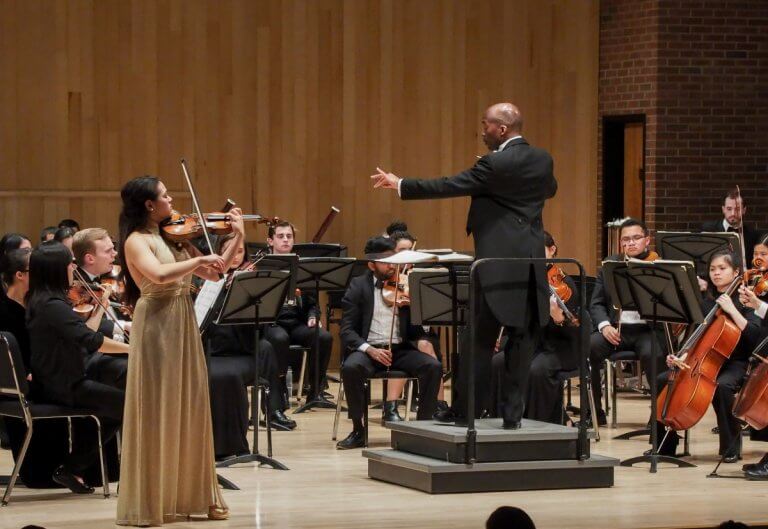
To find out what makes Department of Music at the University of Connecticut (UConn) so unique, Study International asked music students about what they thought of their experience so far. To shine a light on UConn student life, the following quotes are from Olga Radović (Masters in Piano Performance), Brandon Kaplan (Masters in Viola Performance) and Sarah Himmelstein (Performer’s Certificate).
Culture in Connecticut
Nestled in the US region of New England, UConn’s distinguished Department of Music is at the heart of Connecticut’s music scene. Equipped with the von der Mehden Recital Hall, the university attracts thousands of guests every year and hosts nearly 130 concerts and events. Here, there are incredible opportunities for students to transfer skills learnt in the classroom to the stage. By engaging in this form of self-promotion, you will pick up valuable skills and enhance your performance portfolio.
To add to the ever-growing cultural hub of Connecticut, there’s also the Jorgensen Center for the Performing Arts located nearby. Dedicated to UConn President Albert N. Jorgensen, the center hosts informative Concert Talks with special guest speakers and extraordinary musical workshops for students to get involved in. This year, one of the many professionals flowing through the center’s doors is mezzo-soprano Joyce DiDonato. Since Jorgenson is set just a short walk from the Fine Arts Complex, students are excited about exclusive upcoming events.

As current student Sarah explains, attendance at a concert can often result in beneficial industry links. “The music scene at UConn is just as diverse as the people in it,” she says. “Music students at UConn perform in both large and small ensembles, in the operas, and as soloists in recitals. Because Connecticut is small, we generally find our way into musical opportunities through connections with people. Many of our faculty know music directors of opera companies and choirs, and I actually found quite a few jobs through the connections at UConn.”
Progress with UConn’s programs
On top of undergraduate degrees, the department offers many postgraduate programs for you to refine your musical talent. Many students are particularly enticed by the Master of Music (M.M) degree. With the option to choose from vocal performance, instrumental performance or choral conducting, here, your ambitions aren’t restricted to a single category.
Another UConn course advantage is the ability to become a Teaching Assistant alongside your studies. Taking on this valuable role, you’ll add to your professional résumé and build your confidence through presentation and lecture practice.
As Brandon explains: “The Master’s program provides an opportunity to perform through multiple types of ensembles. With the Teaching Assistantship, I was given the opportunity to teach String Methods, which is a necessary course for music education majors to help prepare them for the technical and pedagogical concepts.”

Or, like Sarah, you may want to opt for a Performer’s certificate. Sarah says the certificate gave her the same graduate experience, but with an additional twist. “The Performer’s Certificate is a unique program because it allows students to continue studying their instrument and gain valuable performing opportunities in the operas and ensembles,” she states. “Without the rigorous credit load [of a degree program such as the Masters or doctorate], students can dedicate more time to refining their performance skills.”
Compose your future
UConn’s Department of Music has specifically designed courses with its learners’ prospects in mind. By integrating work-based tasks into lessons, the school helps you to prepare for real-life working environments. You’re encouraged to take a multidimensional approach to your talent and feed it into other formats, such as mentoring other students or formulating a masterpiece of your own.
What makes this department so exquisite is the range of UConn ensembles you have the potential to engage with. There’s the student Symphony Orchestra for classical collaborations, the 17-piece Jazz Lab Band to jam with, and also the UConn Marching Band. This diverse music department undoubtedly has something for everyone!

According to Olga, the university offers you a variety of work-based learning schemes to jump into. “As a pianist, UConn’s opportunities have allowed me to try out teaching, collaborating, accompanying and solo performing. However, whatever choice I make, I know that I will be able to do it since I am learning how to conquer challenges every day at UConn.”
A final note…
And for any prospective student considering musical study at UConn, the current students say this:
Olga: “I would warmly recommend UConn to any student who is considering their next academic step. They have a great school with superb facilities, and the location is close to two of the biggest cultural centers in US – Jorgensen Center and von der Mehden Recital Hall. I know that switching to a work and study type of degree is not easy, especially at the beginning. But with so much support, a young performer can grow into a professional musician in just a couple of months.”
Brandon: “UConn has provided me with a solid musical foundation which will ultimately aid in facilitating a successful music career. It’s a great opportunity with a multitude of resources. Plus, by surrounding yourself with driven and like-minded UConn students, you’ll get a great start on your musical journey!”
Sarah: “Remember to have an open mind and know that your musical journey will never look like anyone else’s. The UConn music department is very supportive so don’t be afraid to try new things!
Follow UConn Music on Facebook, Twitter, YouTube and Instagram
Liked this? Then you’ll love these…
The harmony produced when theory meets practice
Tune into your talent with the Royal Northern College of Music







